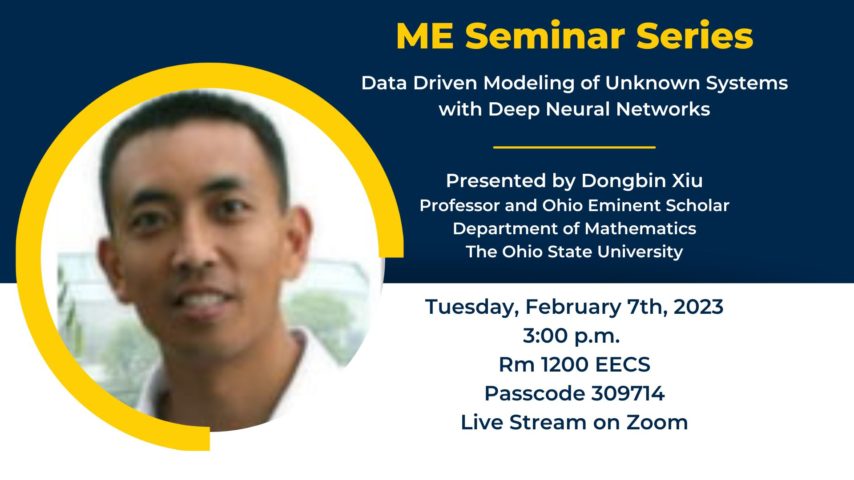Seminar Series
ME SEMINAR Series
VirtualME SEMINAR Tarasankar DebRoy Virtual
VirtualDigital Twins in Additive Manufacturing – concepts, building blocks, and applications Tarasankar DebRoy Professor Materials Science and Engineering Penn State VIRTUAL SEMINAR Tuesday,October 25, 2022 4:00 p.m. ME Seminar Zoom link (QR Code below) Passcode 309714 Add ME Seminar to Google Calendar Abstract A digital twin of additive manufacturing is a virtual […]
ME Seminar Jennifer Dunn
VirtualLife Cycle Assessment as a Lighthouse: GuidanceTowards a Sustainable Harbor and Away From Peril Jennifer B. Dunn Associate Professor, Chemical and Biological Engineering, Northwestern University Director, Center for Engineering Sustainability and Resilience Associate Director, Northwestern-Argonne Institute of Science and Engineering Abstract Lighthouses guide ships toward a safe harbor and provide warnings of shallow water and […]
ME SEMINAR Pierre Deymier
VirtualDemystifying the Quantum Paradigm using Acoustic Metamaterials– Phi-bits as Quantum Computing Acoustics Analogues Pierre Deymier Professor of Materials Science and Engineering University of Arizona VIRTUAL SEMINAR Tuesday, November 8, 2022 4:00 p.m. Abstract Ensuring U.S. leadership in quantum information science (QIS) is a national priority. While the phenomenon of entanglement is atthe core of future […]
ME Special Seminar – Ricardo Decca, PhD
Room No: 2000, Michigan Materials Research Institute 2301 Bonisteel Blvd, Ann Arbor, United StatesRicardo Decca, Ph.D. Professor, Department of Physics, Indiana University-Purdue University, Indianapolis “What do we measure when we put two bodies close to each other?” 11:00 AM - 12 Noon, Tuesday, November 29, 2022 Room No: 2000, Michigan Materials Research Institute, 2301 Bonisteel Blvd, Ann Arbor, MI 48109 Abstract: In this talk, we will present a […]
ME Faculty Seminar Series: Daniel Cooper
2505 GGB 2350 Hayward St, Ann Arbor, MI, United StatesIndustry already accounts for approximately one-third of global greenhouse gas emissions and these emissions are growing quickly as the developing world industrializes and emissions-intensive materials are used to deliver better performing technologies. We need sustainable materials processing solutions that fit the scale and urgency of the challenge.
ME Seminar Series: Jian Wang
2505 GGB 2350 Hayward St, Ann Arbor, MI, United StatesNanoscale dual-phase alloys composed of alternate metal (soft) and intermetallic or covalently bonded (hard) strengthening phase exhibit high strength, high strain hardening rate, and measurable plasticity at ambient and elevated temperatures. Here we report unusual plasticity carriers in intermetallic Al 2 Cu and covalently bonded Silicon in Al-Si and Al-Cu alloys based on multiscale experiments and modeling.
Special Lecture: Drug Delivery for Heart and Lung Repair by Ke Cheng
1003 EECSTherapeutic tissue regeneration using stem cells has been hampered by the controversial identity of resident stem cells, low cell retention/engraftment, tumorigenecity and immunogenicity issues. Taking a bioengineering/biomaterials approach, this lecture will introduce the uses of drug delivery and biomaterials strategies to generate more potent cell therapies for heart and lung diseases.
ME Seminar Series: Daniel Cohen
2505 GGB 2350 Hayward St, Ann Arbor, MI, United StatesWe are working to accomplish for cells something akin to what a shepherd and sheepdogs bring to flocks of sheep: control over large-scale collective cellular motion. As coordinated cellular motion is foundational to many forms of multicellular life, being able to ‘herd’ or program large-scale cell migration raises exciting possibilities for accelerated healing, tissue engineering, and novel biomaterials.
ME Seminar Series: Simon Sponberg
1200 EECS 1301 Beal Ave, Ann Arborr, MI, United StatesThe ability to move is a trait of all animals. Yet how do animals, including ourselves, get around in this complex and uncertain world with an ease and agility we find hard to recreate in engineered systems?
ME Seminar Series: Dongbin Xiu
1200 EECS 1301 Beal Ave, Ann Arborr, MI, United StatesWe present a framework of predictive modeling of unknown system from measurement data. The method is designed to discover/approximate the unknown evolution operator behind the data. Deep neural network (DNN) is employed to construct such an approximation. Once an accurate DNN model for evolution operator is constructed, it serves as a predictive model for the unknown system and enables us to conduct system analysis.
